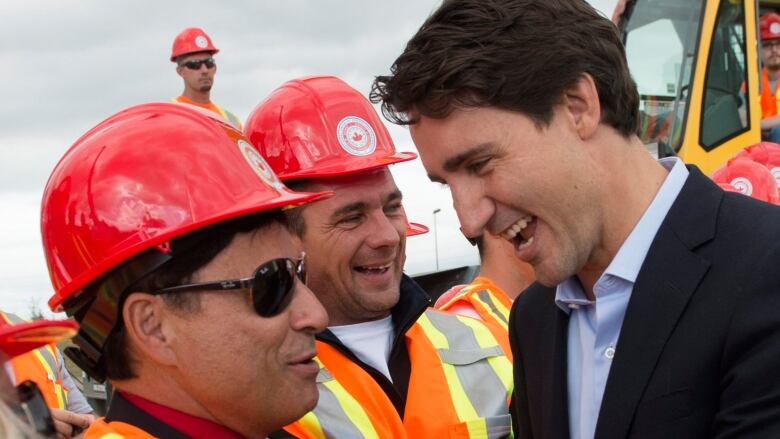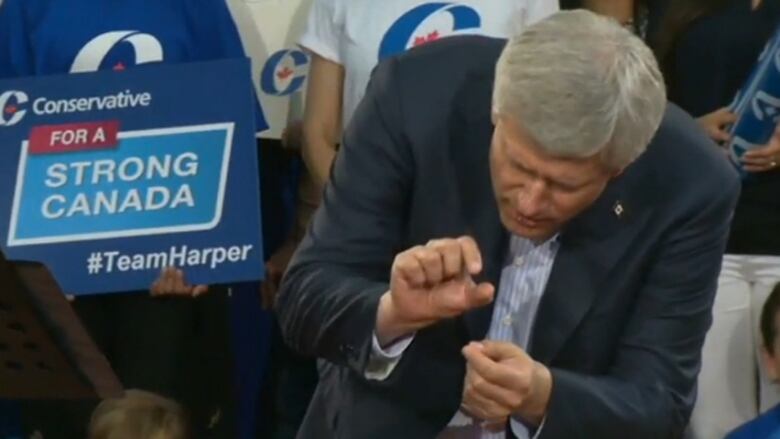Spin Cycle: When should deficits stop?
Justin Trudeau says, if elected, his government will run 3 years of deficits to pay for infrastructure

"We are focused on creating that growth that is necessary so that we can grow back into balance out of Mr. Harper's deficit by 2019."
Liberal Leader Justin Trudeau on why he will run deficits.
There is little denying the Liberals handed their rivals a political gift on Thursday by announcing that, if elected, they will run deficits in the first three years of their mandate.
It allowed NDP Leader Tom Mulcair to practically don a Tea-Party hat as he darted to the political right of Trudeauin an attempt to easethe fears of those still worried about allowing the "socialists" into the pantry.
- Interactive: Canada's surplus and deficits, 1963-2015
"I'm tired of watching governments put that debt on the backs of future generations," he intoned, a day after committing his partytobalancing the first budget of its mandate should the party win the election.
For the Conservatives, the political gift provoked a reaction that was as immediate as it was out of character. Stephen Harper did something even his supporters say istoo infrequent: he smiled and cracked a joke.

"[Trudeau] says he'll run a modest deficit, a tiny deficit, so small you can hardly see the deficit," Harper said with squinted eyes peering through the gap of his closely held fingers as though trying to findit himself.
After weeks of enduringthe wounds of the Mike Duffy scandal being reopened in a very pubic way the comedic routine was well received by supporters and, apparently, the internet.
The spin
Trudeau says the government needs to spend $125 billion over the next decade to rebuild, repair and enhance the nation's infrastructure.
Also, he says, the stimulus money is needed to raise the economy out of recession.
"Our economy needs investment in order to create growth," he announced on Thursday."That growth will eliminate the Harper deficit and we will balance the budget in 2019."
The counter-spin
Reaction out on the campaign trail seemed to haveless to do withTrudeau's infrastructure promise and more to his deficit admission.
"He has no idea what he's talking about when it comes to these things," Harper fumed when reporters asked for his reaction. "That's why you can be sure that his small deficits will become large deficits."
(This was before he apparently found the humour in it).
Mulcair paid short shrift to Trudeau and the Liberals, saying only "they want to run several years of deficits," before turning his sights back to Harper and his "eight consecutive deficits."*
Politics vs. economics
The Conservative's long-standingpledge to balance this budget this year has thrust the question of deficits to the forefront of this campaign.
However, those who follow money more closely than politicswill tell you with the numbers we are talking about it doesn't really matter.
"Economically speaking there really isn't all that much of a difference between a small surplus and a small deficit," according to Randall Bartlett, senior economist with TD Economics.
In Finance, everything is relative so the number economists worry about is the size of the deficit relative to GDP and any number that can be rounded-down to "0 per cent," is considered small.
Less than half of a percentage point of the Canadian economy right now is in the neighbourhood of $8-billion.
Low, low rates
Another aspect to look at before borrowing more is how much is it currently costing to carry the debt.
Although the national debt has increased by nearly $160-billion in the last seven years, it's been decades since debt servicing has been this low.
The ratio here that economists worry about is how much of a country's tax revenues go toward paying the interest on its debts. Right now, the government is spending a little more than 10 cents for every $1 of tax revenue.
In the early 1990's it was spending almost 35 cents on the dollar.
The rinse
If a future Liberal government ran two deficits of "no morethan $10-billion" and then one smaller deficit after that before returning to balance, it's highly unlikely the country's debt to GDP ratio would rise. The cost of servicing that debt when compared to revenues would also likely go down.
In short: Canada can afford it.
But do we need it?
On one hand, there is little doubt the economy shrank for the first half of the year a technical recession.
However, economists believe we are already in recovery and no additional stimulus is needed.
On the other hand, municipalities dealing with crumbling bridges, leaking water mains, and outdated transit systems have been begging for help for years.
Mini spin cycle: How many consecutive deficits have there been?
The Spin: The Liberals and NDP say the Conservative government has run eight consecutive deficits.
The Counter-spin: The Conservatives say the country has already returned to surplus
The Rinse:Finance Canada has only confirmed six budget deficits under this government.
Starting in 2008-09 until 2013-14, the country ran-up a total of $144.7 billion in deficits.
The finally tally for 2014-15 is expected in the coming weeks the NDP and Liberals are assuming it will confirm a deficit, to make it seven in a row.
However, the initial numbers pointed to a $2.9-billion surplus, but that was before the Conservatives spent a little more than $3 billion in enhancing the UCCB.
Still, it tough to believe with nearly $600 billion in combined revenues and spending the government won't find a way to bridge the gap.
The current 2015-16 fiscal year would be the eighth the NDP and Liberals are referring to.
We are less than half way through it, so it is tough to say whether it will be a deficit year. Still, we are currently in what would be the eighth year by the Liberal and NDP count.












_(720p).jpg)


 OFFICIAL HD MUSIC VIDEO.jpg)
.jpg)



























































































